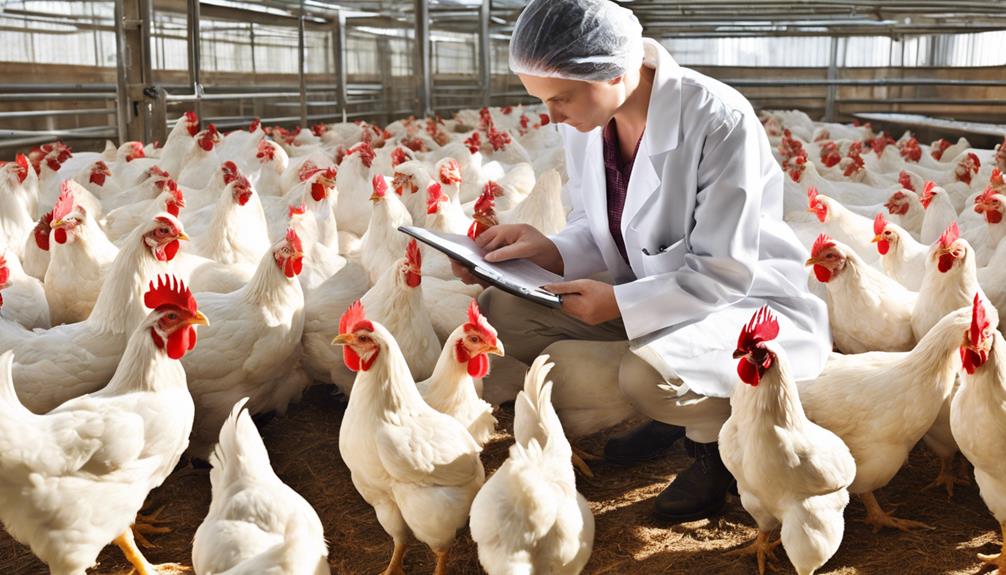10 Tips for Regulating Antibiotic Use in Chicken Farming"
When regulating antibiotic use in chicken farming, you must implement strict guidelines. Monitor administration closely, educate farmers on responsible use, and conduct regular audits. Encourage natural alternatives, collaborate with veterinarians, promote antibiotic-free practices, and support research on resistance. Engage with regulatory bodies for updates. By following these tips, you can safeguard poultry health and prevent antibiotic resistance effectively.
Implement Strict Antibiotic Guidelines
By establishing clear and stringent antibiotic guidelines, chicken farmers can significantly reduce the risk of antibiotic resistance in poultry and safeguard public health. Antibiotic stewardship is crucial in poultry farming to ensure that antibiotics are used judiciously and responsibly. This involves developing comprehensive guidelines that outline when and how antibiotics should be administered to chickens. Monitoring antibiotic usage is essential to track compliance with these guidelines and identify any deviations promptly.
Compliance with antibiotic guidelines is paramount to prevent the overuse and misuse of antibiotics in chicken farming. Farmers must be educated on the importance of following these guidelines and the potential consequences of antibiotic resistance. Providing training sessions and informational materials can help increase awareness and promote adherence to recommended practices. By fostering a culture of responsibility towards antibiotic use, farmers can contribute to the long-term effectiveness of antibiotics in treating poultry diseases.
Implementing strict antibiotic guidelines requires dedication and vigilance from all stakeholders involved in chicken farming. Regular audits and checks should be conducted to assess compliance levels and address any non-compliance issues promptly. Continuous education and reinforcement of antibiotic stewardship principles are essential to ensure that farmers understand the importance of their role in preventing antibiotic resistance. By adhering to stringent guidelines and promoting compliance through education, chicken farmers can play a significant role in safeguarding public health and preserving the efficacy of antibiotics in poultry production.
Monitor Antibiotic Administration Closely
To ensure precise antibiotic administration in chicken farming, closely monitoring the dosage and frequency of antibiotic use is imperative. Antibiotic resistance awareness and monitoring are crucial aspects that demand meticulous attention. Here are three key strategies to effectively monitor antibiotic administration:
- Implement Regular Audits: Conduct routine audits to track the usage of antibiotics on the farm. These audits should include detailed records of the type of antibiotics used, dosages administered, and frequency of use. By keeping thorough documentation, any deviations or anomalies can be quickly identified and addressed.
- Provide Ongoing Farmer Training: Educate farmers on the importance of adhering to proper antibiotic administration protocols. Offer training sessions that focus on dosage calculations, administration techniques, and the risks associated with antibiotic resistance. Supervision plays a critical role in ensuring that farmers follow the recommended guidelines consistently.
- Utilize Technology for Monitoring: Embrace technological solutions such as automated medication dispensers or tracking systems to monitor antibiotic administration accurately. These tools can help in recording precise dosages, scheduling medications, and generating reports for analysis. By leveraging technology, farmers can enhance the precision and efficiency of antibiotic administration practices.
Educate Farmers on Responsible Antibiotic Use
Farmers must undergo comprehensive training programs emphasizing responsible antibiotic use to enhance understanding and adherence to proper administration protocols. Training sessions should cover topics such as the importance of following dosage instructions, recognizing signs of antibiotic resistance, and understanding the implications of improper antibiotic use on both animal health and human consumption. These sessions should be structured to provide farmers with practical knowledge that they can easily apply on the farm.
In addition to training sessions, outreach programs can be instrumental in educating farmers on responsible antibiotic use. These programs can involve visits to farms by veterinary professionals or agricultural specialists who can provide hands-on demonstrations and guidance. Outreach programs can also include informational materials such as brochures or videos that farmers can refer to for ongoing support and education.
Establish Regular Antibiotic Audits
Implementing routine antibiotic audits ensures strict compliance with usage guidelines and enhances oversight of antibiotic administration practices on chicken farms. By conducting regular audits, you can stay informed about antibiotic usage trends and monitor effectiveness to make informed decisions for the health of your flock.
Here are three key benefits of establishing regular antibiotic audits:
- Identifying Patterns: Through audits, you can track antibiotic usage patterns over time. This data allows you to pinpoint any concerning trends, such as overuse or misuse of antibiotics. By recognizing these patterns early, you can take corrective action to prevent antibiotic resistance and ensure the effectiveness of these medications in the long term.
- Ensuring Proper Dosage: Monitoring antibiotic effectiveness involves verifying that the prescribed dosages are being administered correctly. Audits can help you confirm that the right amount of antibiotics is being given to the chickens as per guidelines. This step is crucial in preventing underdosing, which can lead to ineffective treatment, or overdosing, which may contribute to antibiotic resistance.
- Enhancing Accountability: Regular audits create a culture of accountability among farm staff regarding antibiotic use. By consistently reviewing practices and results, you promote adherence to protocols and foster a sense of responsibility towards the proper administration of antibiotics. This heightened accountability can significantly improve the overall health outcomes of your chicken flock.
Encourage Natural Alternatives to Antibiotics
Consider exploring natural alternatives to antibiotics as a proactive approach to promoting the health of your chicken flock. Embracing natural remedies can be a holistic approach to maintaining the well-being of your chickens while reducing reliance on antibiotics.
One effective natural remedy is the use of probiotics. Probiotics are beneficial bacteria that can help maintain a healthy gut flora in chickens, making them more resistant to harmful pathogens. By adding probiotics to your chickens' diet, you can enhance their immune system and overall health.
Another natural alternative to antibiotics is the use of essential oils. Essential oils such as oregano, thyme, and cinnamon have antimicrobial properties that can help combat infections in chickens. These oils can be administered through the drinking water or sprayed in the chicken coop to create a healthier environment for your flock.
Furthermore, herbal supplements like garlic and turmeric can also boost the immune system of your chickens and help them fight off infections naturally. These supplements can be easily incorporated into the chickens' feed to provide additional health benefits.
Incorporating these natural alternatives into your chicken farming practices can't only reduce the need for antibiotics but also promote a more sustainable and environmentally friendly approach to poultry health management. By taking a holistic approach to caring for your chickens, you can ensure their well-being while minimizing the risks associated with antibiotic overuse.
Enforce Penalties for Non-Compliance
Enforcing penalties for non-compliance with antibiotic regulations is crucial in maintaining the integrity of chicken farming practices and upholding standards of animal health and welfare. To effectively enforce compliance, consider the following:
- Increase Awareness: Education plays a vital role in ensuring that all stakeholders in the chicken farming industry understand the importance of antibiotic regulations. By conducting workshops, distributing informational materials, and utilizing digital platforms, awareness can be heightened regarding the risks associated with antibiotic misuse and the benefits of adherence to regulations.
- Strengthen Enforcement: Implementing strict monitoring mechanisms is essential to detect and deter non-compliance. Regular inspections, random audits, and testing protocols can help ensure that farmers are adhering to antibiotic regulations. Additionally, establishing clear consequences for violations, such as fines or suspension of farming licenses, can serve as effective deterrents.
- Enhance Reporting Systems: Developing robust reporting systems enables swift identification of non-compliance issues. Encouraging whistleblowing and anonymous reporting can help uncover violations that may otherwise go unnoticed. By fostering a culture of transparency and accountability, the chicken farming industry can work towards a more compliant and sustainable future.
Collaborate With Veterinarians for Oversight

Collaborate closely with experienced veterinarians to ensure effective oversight of antibiotic use in chicken farming practices. Veterinarian collaboration is crucial for establishing robust regulatory oversight mechanisms to monitor and manage antibiotic usage on farms. By working hand in hand with veterinarians, you can tap into their expertise in animal health and antibiotic management to develop tailored strategies that promote farm sustainability.
Veterinarians play a vital role in overseeing antibiotic use in chicken farming. Their specialized knowledge allows for the implementation of precise antibiotic protocols that adhere to regulatory standards. Through regular consultations and on-site visits, veterinarians can assess the health of the poultry, evaluate the need for antibiotics, and recommend appropriate treatment plans. This collaborative approach ensures that antibiotics are used judiciously, minimizing the risk of antimicrobial resistance and safeguarding animal welfare.
Effective communication and partnership with veterinarians are essential for maintaining transparency and accountability in antibiotic management. By fostering a culture of collaboration, you can establish a framework for continuous improvement in antibiotic stewardship practices. Veterinarians can provide valuable insights into alternative disease prevention strategies, reducing the reliance on antibiotics while promoting the long-term health and productivity of the flock.
Promote Antibiotic-Free Farming Practices
To enhance the sustainability and health of your chicken farm, prioritize implementing antibiotic-free farming practices. By transitioning towards antibiotic-free practices, you not only contribute to a healthier environment but also meet the growing consumer demand for poultry raised without antibiotics. Here are three key steps to promote antibiotic-free farming practices:
- Consumer Awareness:
Educate your customers about the benefits of antibiotic-free chicken. Consumers are increasingly conscious of the food they eat and the impact on their health. By transparently sharing your antibiotic-free farming methods, you can build trust and loyalty among your customer base.
- Sustainable Practices:
Implement sustainable farming practices that reduce the need for antibiotics. Focus on preventive measures such as improving sanitation, optimizing nutrition, and providing adequate living conditions for your chickens. Sustainable practices not only benefit the environment but also contribute to the long-term health of your poultry.
- Industry Standards and Public Health:
Stay informed about industry standards regarding antibiotic use in poultry farming. By adhering to regulations and best practices, you contribute to public health efforts to combat antibiotic resistance. Your commitment to antibiotic-free farming practices supports broader initiatives aimed at preserving the effectiveness of antibiotics for future generations.
Support Research on Antibiotic Resistance

Supporting research on antibiotic resistance involves analyzing the latest scientific findings to identify emerging trends and develop innovative solutions for combating bacterial adaptation. To effectively address this pressing issue, funding initiatives play a crucial role. By allocating resources towards research projects focused on antibiotic resistance, scientists can delve deeper into understanding the mechanisms behind bacterial evolution and resistance development. This financial support enables the exploration of new treatment options and preventative measures that can help mitigate the growing threat of antibiotic-resistant bacteria in chicken farming.
Moreover, public awareness is key in garnering support for research efforts aimed at combating antibiotic resistance. Educating the public about the dangers of overusing antibiotics in poultry farming can help foster a sense of responsibility and encourage individuals to advocate for sustainable farming practices. Increased public awareness can also lead to greater community involvement in fundraising campaigns or support initiatives aimed at advancing research in this field.
Engage With Regulatory Bodies for Updates
Engage proactively with regulatory bodies to stay informed on the latest updates regarding antibiotic use in chicken farming practices. This engagement is crucial for maintaining regulatory compliance and adhering to industry standards.
Here's how you can effectively engage with regulatory bodies:
- Stakeholder Engagement: Actively participate in stakeholder engagement sessions organized by regulatory bodies. These sessions provide valuable insights into upcoming policy updates related to antibiotic use in chicken farming. By engaging with stakeholders, you can contribute your perspective, stay informed about potential changes, and have a voice in the decision-making process.
- Policy Updates: Regularly monitor and review policy updates issued by regulatory bodies. Changes in regulations can significantly impact antibiotic use in chicken farming practices. By staying up-to-date with policy updates, you can ensure that your farm operates in compliance with the latest requirements and guidelines. Additionally, being aware of policy changes allows you to make timely adjustments to your practices.
- Regulatory Compliance: Establish clear communication channels with regulatory bodies to seek clarification on compliance requirements. Understanding and meeting regulatory compliance standards are essential for responsible antibiotic use in chicken farming. By proactively engaging with regulatory bodies, you can address any compliance concerns, seek guidance on best practices, and demonstrate your commitment to upholding industry standards.
Frequently Asked Questions
Can Consumers Trace the Antibiotics Used in Chicken Products Back to the Farms?
When it comes to tracing antibiotics used in chicken products back to the farms, consumers can have more transparency. Antibiotic tracking is crucial for consumer awareness and holding farms accountable.
By implementing systems that allow for the tracking of antibiotics from farm to table, consumers can make more informed choices about the products they purchase.
This level of transparency ensures that farms are held to high standards and promotes responsible antibiotic use in chicken farming.
How Often Should Farmers Undergo Antibiotic Use Training?
To maintain optimal antibiotic stewardship on chicken farms, it's crucial to ensure that farmers undergo regular refresher training on antibiotic use.
This training should be scheduled at appropriate intervals to reinforce proper practices and keep farmers informed about the latest guidelines.
Compliance checks can also be beneficial in verifying that farmers are implementing their training effectively and consistently.
What Are the Consequences for Repeated Non-Compliance With Regulations?
Repeated non-compliance with regulations in chicken farming can result in severe consequences. Financial penalties may be imposed, impacting your bottom line.
Additionally, your operations could face suspension, halting your business activities. It's crucial to adhere to regulations to avoid these repercussions and maintain a successful operation.
Be diligent in following guidelines to prevent such outcomes and ensure the well-being of your farm.
Are There Incentives for Farmers to Transition to Antibiotic-Free Practices?
Transitioning to antibiotic-free practices can bring financial benefits due to market demand for healthier products. By meeting consumer preferences, you can potentially increase sales and access niche markets that value antibiotic-free chicken.
Embracing this change can also lead to reduced costs associated with purchasing antibiotics, contributing to overall savings in the long run. Responding to market trends by going antibiotic-free can position your farm for success and sustainability in the poultry industry.
How Are Audit Results Communicated to the Public for Transparency?
When it comes to public trust and accountability, transparency is key in communicating audit results. The way these findings are shared with the public impacts how transparent and accountable the process is perceived to be.
Clear and timely communication is crucial for fostering trust and demonstrating a commitment to accountability in chicken farming practices. Utilizing various channels to share audit results can enhance transparency and maintain open lines of communication with the public.
Conclusion
In conclusion, implementing strict guidelines, monitoring closely, educating on responsible use, and promoting natural alternatives are key to regulating antibiotic use in chicken farming.
Regular audits, collaboration with veterinarians, and support for antibiotic-free practices are essential.
Supporting research on antibiotic resistance and engaging with regulatory bodies for updates will ensure the health and safety of both chickens and consumers.
By following these tips, you can effectively manage antibiotic use in chicken farming and contribute to a more sustainable industry.
